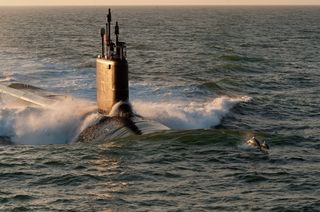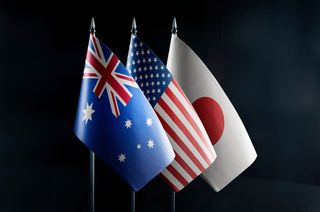The American Conservative
By Tom Switzer
What is the only nation to have joined the United States in the foxhole in every major military intervention in the past century? If you thought Britain or Canada or other NATO allies, you’d be wrong. In fact, it is Australia—which Charles Krauthammer once observed, “understands America’s role and is sympathetic to its predicament as reluctant hegemon.”
So it is hardly surprising we Aussies were the first nation to back the U.S. campaign against the Islamic State, otherwise known as ISIS or ISIL. Last September, our conservative Prime Minister Tony Abbott sent 400 airmen and about 200 Special Forces personnel to the fight. And this week he announced the deployment of 300 Australian army instructors to Iraq by the middle of this year. It is part of a joint training mission with New Zealand to help degrade and destroy the Sunni jihadist group that, as Abbott put it today, “has been reaching out to us for months now.”
Australia has foiled several homegrown terrorist plots during the past decade, and the reach of Islamist terror hit Sydney last December when a self-styled sheikh held dozens of hostages in a downtown café; two died. That is why Abbott speaks for Middle Australia when he says the aspirations of the “apocalyptic death cult” are not simply to conquer and control a limited territory in the Middle East. “It claims a universal allegiance.”
It is also true that the new mission to help train the Iraqi army to recapture the Sunni strongholds from Sunni insurgents resonates with the broad cross-section of the Australian people, including the opposition Labor Party. The logic here is that because the Islamic State is a bunch of brutal barbarians, and the world would be a much better place without them, then the mission is self evidently a noble cause.
And yet the new mission in Iraq hardly serves the national interest of Australia or New Zealand, or for that matter the U.S. The goal to eradicate Sunni jihadists, if one is concerned to be effective and not merely to feel virtuous, is complicated, potentially dangerous and fraught with the danger of unintended consequences. Ending evil is a long, tough slog.
For one thing, we’ve been there before, and the result was an unmitigated disaster that cost what Australia’s longest serving prime minister Robert Menzies called “our great and powerful friend” dearly in blood, treasure, credibility and prestige. We not only played a high-profile role in the U.S.-led invasion of Iraq in 2003; we were part of the U.S.-led coalition that trained an Iraqi army to the cost of US$25 billion. This was, remember, the very same Iraqi army that disintegrated in the face of the initial Islamic State assault last summer. The same Iraqi army that has shown itself to be woefully unprepared to mount any successful attacks on Sunni strongholds north of Baghdad.
Not so long ago, Tony Abbott himself recognized the perils of western involvement in Middle East quagmires. The civil war in Syria “between two unsavoury sides”, he warned in September 2013, was “not goodies versus baddies; it’s baddies versus baddies.” Sounding more like Rand Paul than John McCain, Abbott warned: “We’ve got to be very careful dealing in a powder keg like the Middle East that we don’t take action, well-intentioned action, which could end up making a bad situation worse.”
Alas, that pragmatic and prudent realist no longer exists. Abbott is instead a true believer in the idea that air power, with some Special Forces and army instructors to train the grossly incompetent local army, can help regain Sunni strongholds from Sunni jihadists. Like most Australians, indeed most Americans, he fails to recognize that only a large-scale Iranian-backed Shia militia offensive remains the best hope of defeating the Islamic State jihadists.
And yet as Henry Kissinger once said: “Each success only buys an admission ticket to a more difficult problem.” Iraqi Sunnis view the Shia militia as an alien occupation army that would more than likely commit plenty of atrocities of their own. If the Islamic State fanatics are indeed defeated, moreover, the likely winner would be Iran, a terrorist-sponsoring Shia power that wants to dominate the region.
Like Americans, Australians are understandably spooked by the footage of beheadings of western and Japanese hostages. Little do they know, however, that those carefully choreographed video links are designed to lure us into Iraq. They understandably shock our sensitivities. But with our intervention we are taking the terrorists’ bait. “The biggest proponent of an American invasion,” says Graeme Wood in a widely read article in The Atlantic, “is the Islamic State itself.”
Meanwhile, by intervening in post-Saddam Hussein Iraq for the second time in as many decades, we are reaffirming the potent Sunni narrative that the West is in cahoots with the Shia-run regime in Baghdad. To the extent that such attitudes prevail, and Sunnis feel their loss of power and influence is absolute, many will continue to tolerate or even join Sunni jihadists. In other words, far from draining the swamps of Sunni jihadism, we are likely to replenish them. How the national interest of Australia or the U.S. is served by increasing the prospects of that outcome is not clear.
Unfashionable though it is to say so, we Australians and Americans should keep out of this mess-in-potamia and let the rival sectarian groups settle their differences and reach a political settlement, perhaps even a partition of this arbitrarily created state and ethnically fractured society. Iraq is ultimately a Shia–Sunni war, not ours—unless we continue to make it so.
This article was originally published at The American Conservative




